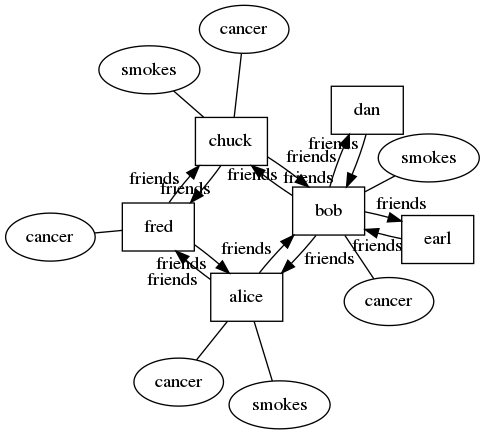Overview
srlearn: A library for learning SRL models with a scikit-learn-style programming interface.
- Source Code: https://github.com/srlearn/srlearn
- Documentation (Latest): https://srlearn.readthedocs.io/en/latest/
Motivation: Crash Course in relational representations
Not all prediction problems fit into nice 2-dimensional vectors \(X\) and 1-dimensional labels \(y\). Network data is often better represented as a collection of entities, their attributes, and their relationships:

cancer(alice).
cancer(bob).
cancer(chuck).
cancer(fred).
friends(alice,bob).
friends(alice,fred).
friends(chuck,bob).
friends(chuck,fred).
...
friends(fred,alice).
friends(bob,chuck).
friends(fred,chuck).
friends(bob,dan).
friends(bob,earl).
smokes(alice).
smokes(chuck).
smokes(bob).
Basic Usage
The general setup is similar to libraries like scikit-learn or Keras that follow: (1) initialize, (2) fit, and (3) predict.
from srlearn.rdn import BoostedRDNClassifier
from srlearn import Background
from srlearn.datasets import load_toy_cancer
train, test = load_toy_cancer()
# Background knowledge about the domain, and its constraints
bk = Background(modes=train.modes)
# Instantiate a model to learn about cancer diagnoses
clf = BoostedRDNClassifier(
background=bk,
target="cancer",
)
clf.fit(train)
clf.predict_proba(test)
# array([0.88079619, 0.88079619, 0.88079619, 0.3075821 , 0.3075821 ])
Furthermore, it includes utilities for model visualization and serialization:
from srlearn.plotting import export_digraph, plot_digraph
plot_digraph(export_digraph(clf, 0))
So we learned that if a person A smokes, then that person is likely to also have cancer, or:
cancer(A) :- smokes(A).
Installation
The latest stable version can be installed from PyPi using pip:
pip install srlearn

